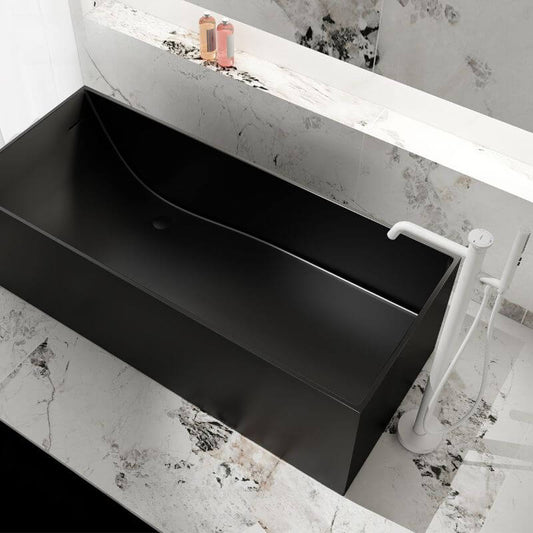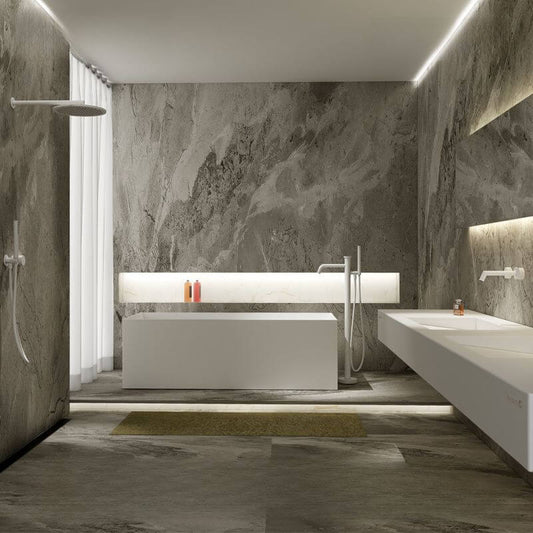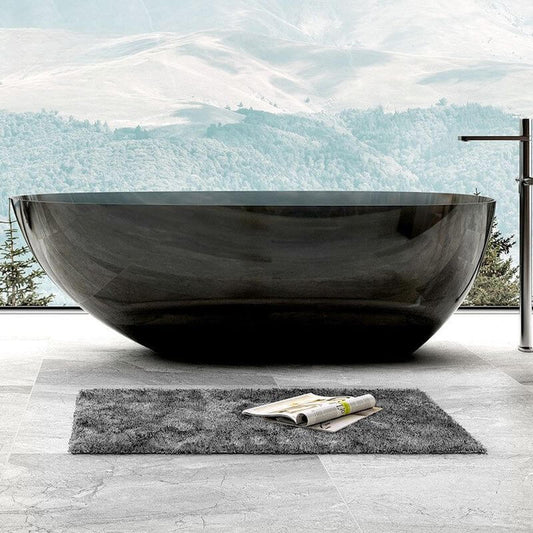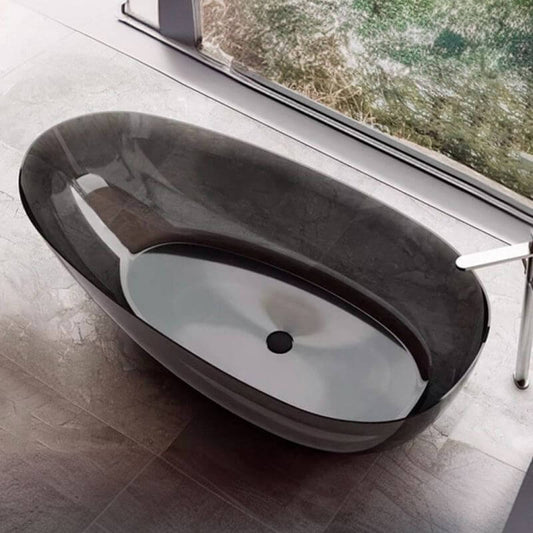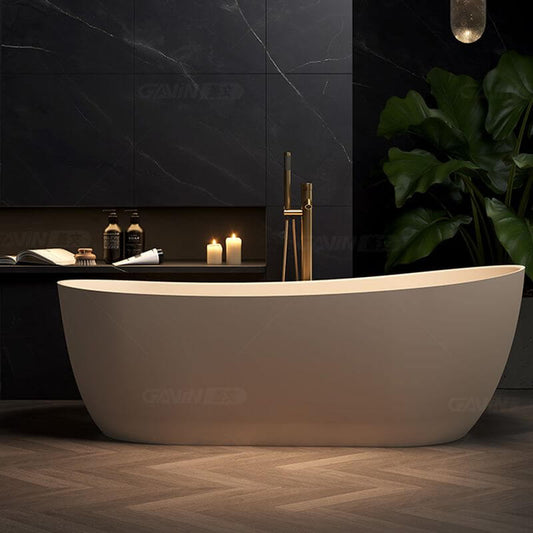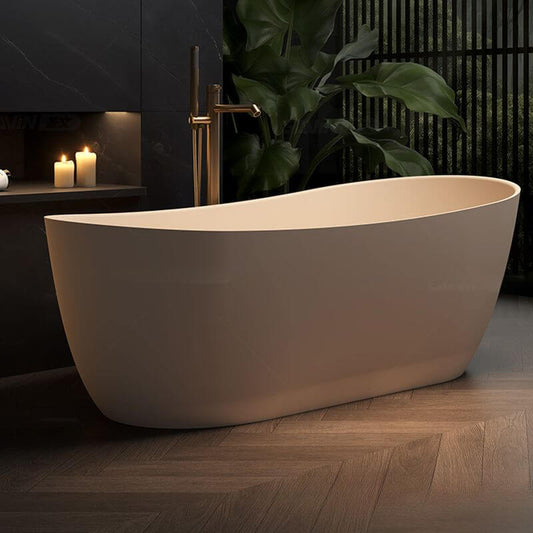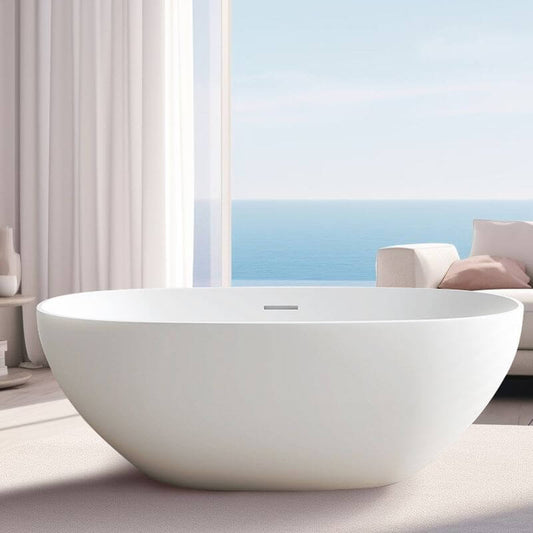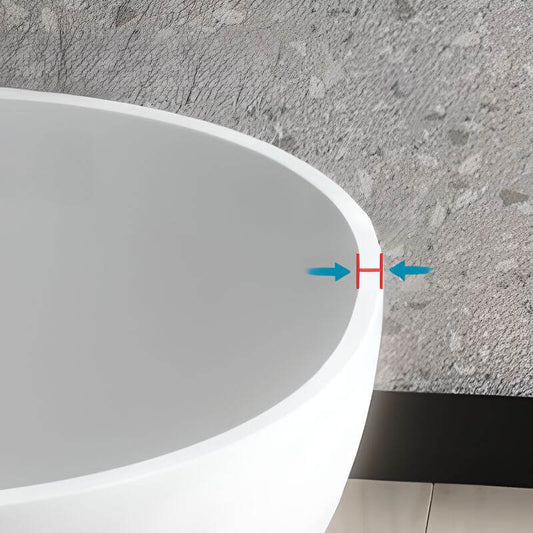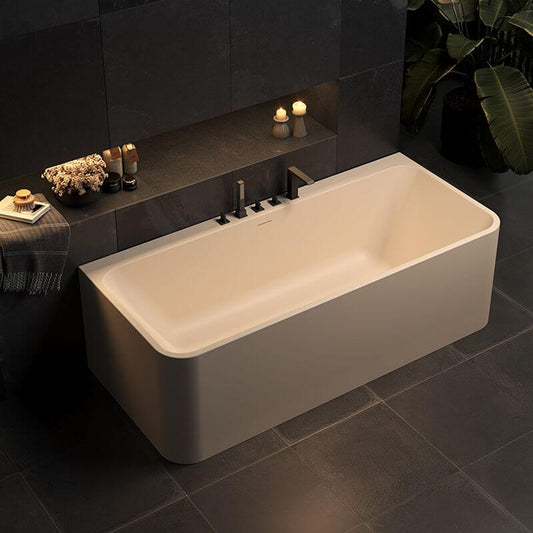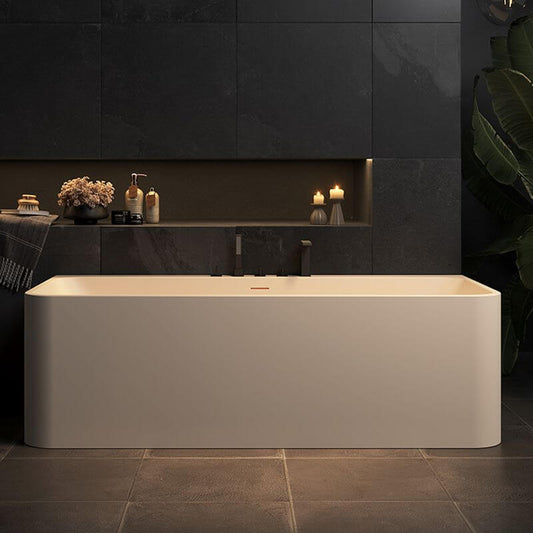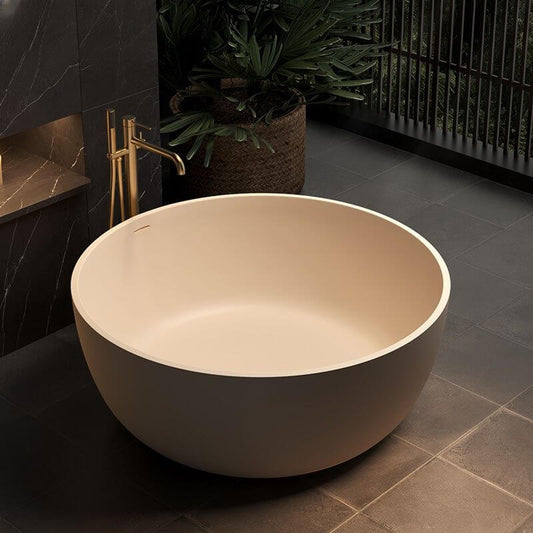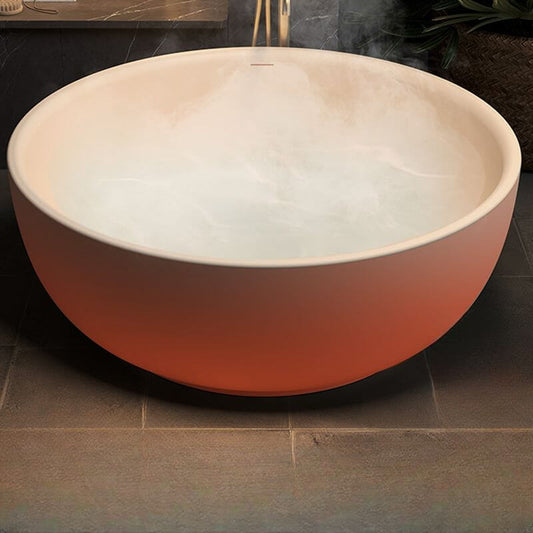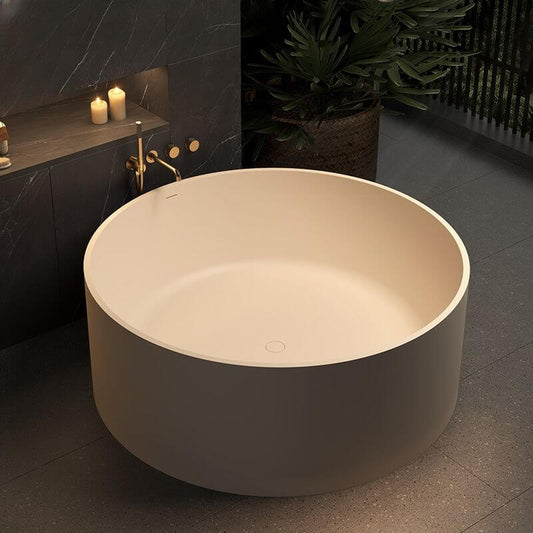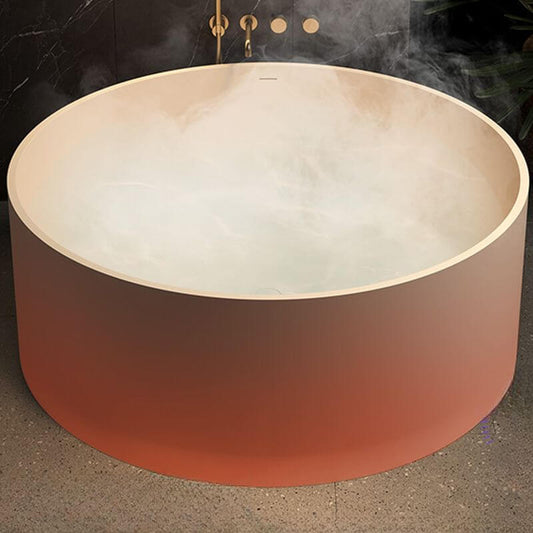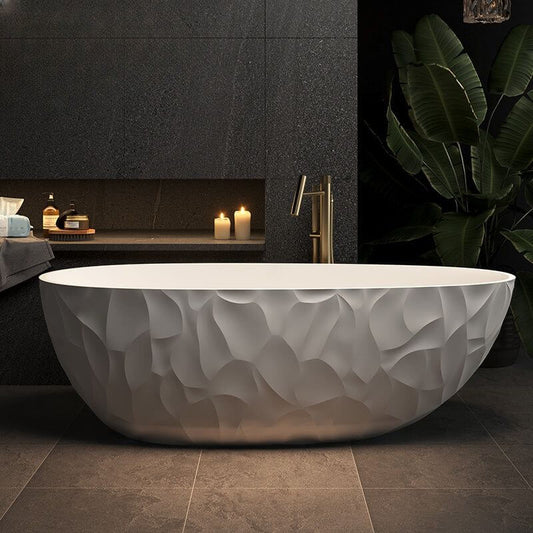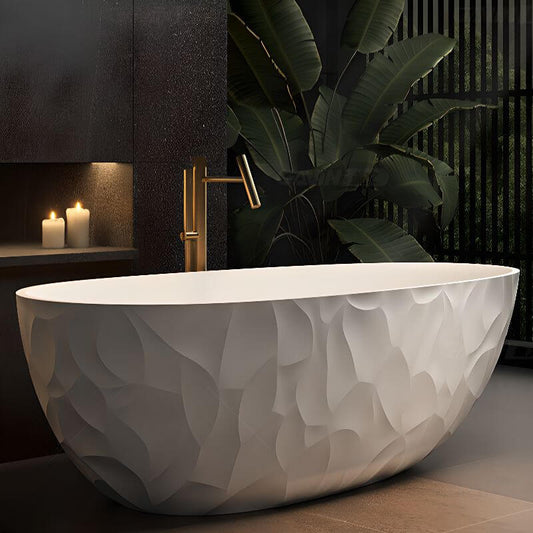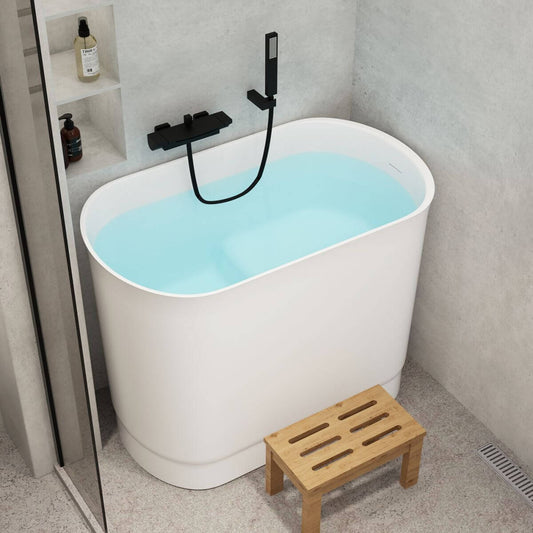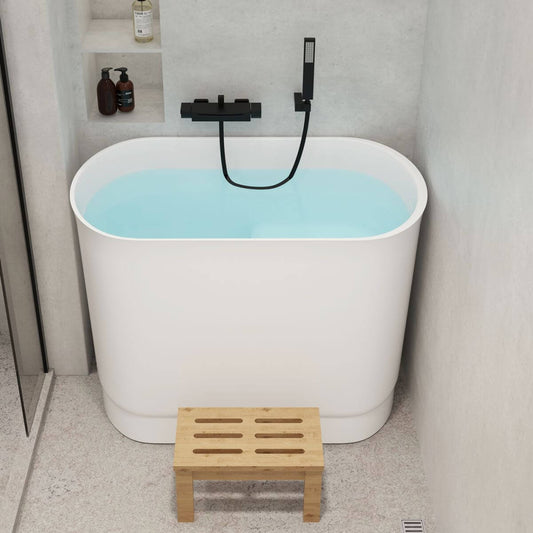Solid Surface vs Stone Resin Bathtubs: What’s the Real Difference?

Introduction
Choosing the perfect bathtub for your bathroom renovation can feel overwhelming, especially when faced with terms like "solid surface" and "stone resin." These materials have surged in popularity due to their luxurious aesthetics and durability, but what’s the real difference between them? Whether you’re a homeowner dreaming of a spa-like retreat or a designer seeking the best material for a client, understanding the nuances of solid surface and stone resin bathtubs is crucial. In this comprehensive guide, we’ll break down their composition, benefits, drawbacks, and practical considerations to help you make an informed decision. From durability and heat retention to cost and maintenance, we’ll explore every angle, backed by data and real-world insights. By the end, you’ll know exactly which bathtub material aligns with your needs, budget, and style for 2025.
What Are Solid Surface Bathtubs?
Solid surface bathtubs are crafted from a synthetic blend of acrylic or polyester resins, natural minerals (like quartz or limestone), and pigments. This composite material, pioneered in the 1960s, is poured into molds to create a seamless, non-porous structure. Known for their smooth, matte finish, solid surface tubs mimic the look of natural stone while offering enhanced performance. According to a 2024 industry report, solid surface materials are used in 35% of luxury bathroom installations due to their versatility and durability [1].
Composition and Manufacturing
Solid surface bathtubs are made by mixing acrylic or polyester resin with mineral fillers like aluminum trihydrate. The mixture is poured into molds, cured under controlled conditions, and polished to achieve a uniform, velvety texture. Unlike layered materials, solid surface tubs are consistent throughout, making them highly durable and repairable.
Key Benefits of Solid Surface Bathtubs
- Durability: Resistant to scratches, chips, and stains, with a lifespan of 15-20 years.
- Customizability: Available in various shapes, sizes, and colors due to the moldable nature of the material.
- Non-Porous Surface: Prevents mold, mildew, and bacteria growth, ideal for hygiene-conscious households.
- Repairability: Minor scratches can be sanded or buffed out at home, extending the tub’s life.
What Are Stone Resin Bathtubs?
Stone resin bathtubs, often called composite stone tubs, combine crushed natural stone (such as marble, granite, or quartz) with high-performance resins and bonding agents. This blend creates a dense, heavy material that feels substantial and luxurious. Stone resin tubs are celebrated for their stone-like appearance and excellent heat retention, making them a favorite in high-end bathroom designs. A 2025 survey found that 28% of premium bathtub purchases were stone resin models [2].
Composition and Manufacturing
The manufacturing process involves crushing natural stone into fine particles, mixing them with polymer resins, and pouring the mixture into molds. After curing, the tubs are coated with a protective gel layer to enhance durability and resistance to water damage. The result is a solid, non-porous bathtub with a matte or satin finish.
Key Benefits of Stone Resin Bathtubs
- Luxurious Aesthetic: Mimics the look and feel of natural stone, adding elegance to any bathroom.
- Heat Retention: Keeps bathwater warm for 30-40 minutes, ideal for long soaks.
- Durability: Highly resistant to cracking and chipping, with a lifespan of 20-30 years.
- Eco-Friendly Options: Some models incorporate recycled materials, appealing to environmentally conscious buyers.
Comparing Solid Surface and Stone Resin Bathtubs
While both materials share similarities, such as non-porous surfaces and luxurious aesthetics, their differences lie in composition, weight, cost, and performance. Below, we compare key factors to help you decide which is best for your bathroom.
Durability and Longevity
Solid surface bathtubs are highly durable, resisting scratches and stains, and can last 15-20 years with proper care. Stone resin tubs, however, edge out slightly due to their denser composition, offering 20-30 years of use. Stone resin’s natural stone content makes it less prone to warping or stress fractures, but both materials outperform acrylic in longevity [3].
Weight and Installation
Weight is a significant differentiator. Solid surface bathtubs typically weigh 135-230 kg (300-500 lbs), making them manageable for most bathroom floors with minimal reinforcement. Stone resin tubs, due to their higher stone content, can weigh 300-400 kg (660-880 lbs), often requiring structural support, especially in older homes. Installation costs for stone resin tubs can be 20-30% higher due to their weight [4].

Heat Retention
Stone resin bathtubs excel in heat retention, keeping water warm for up to 40 minutes, compared to 15-20 minutes for solid surface tubs. This makes stone resin ideal for those who enjoy long, relaxing baths. Solid surface tubs, while still warm to the touch, lose heat faster due to their lower density [5].
Cost Comparison
| Material | Price Range (USD) | Installation Cost (USD) |
|---|---|---|
| Solid Surface | $2,100 - $25,000 | $500 - $1,500 |
| Stone Resin | $3,000 - $30,000 | $800 - $2,000 |
Solid surface bathtubs are generally more affordable, with prices starting at $2,100, while stone resin tubs start at $3,000. Installation costs are higher for stone resin due to its weight and the need for professional handling [6].
Aesthetic and Design Flexibility
Solid surface bathtubs offer greater design flexibility, with options for custom shapes, sizes, and vibrant colors. Stone resin tubs, while also customizable, typically come in neutral tones like white or gray, emphasizing a natural stone aesthetic. Solid surface tubs are ideal for modern, colorful designs, while stone resin suits classic or minimalist bathrooms [7].

Maintenance and Cleaning
Both materials are non-porous, making them resistant to mold, mildew, and stains. Solid surface tubs can be cleaned with mild soap and water, and scratches can be buffed out with sandpaper. Stone resin tubs are similarly low-maintenance but may require professional repairs for chips in the gel coating. Regular cleaning with non-abrasive cleaners is recommended for both [8].
How to Choose Between Solid Surface and Stone Resin Bathtubs
Selecting the right bathtub depends on your priorities. Here’s a step-by-step guide to help you decide:
- Assess Your Budget: Determine how much you’re willing to spend, including installation costs. Solid surface tubs are more budget-friendly, while stone resin offers a premium investment.
- Evaluate Your Bathroom’s Structure: Check if your floor can support a heavy stone resin tub. Consult a structural engineer if needed.
- Consider Your Bathing Habits: If you enjoy long soaks, prioritize stone resin for its superior heat retention.
- Define Your Aesthetic: Choose solid surface for vibrant, modern designs or stone resin for a natural, elegant look.
- Plan for Maintenance: Both materials are low-maintenance, but ensure you’re comfortable with minor repairs like sanding for solid surface tubs.
Practical Tips for Installation
Installing a bathtub requires careful planning. Here are actionable tips for both materials:
- Solid Surface: Ensure proper leveling during installation to prevent stress fractures. Use a professional installer for complex shapes.
- Stone Resin: Reinforce the floor if installing on an upper level. Hire a team experienced with heavy fixtures to avoid damage.
- General: Check plumbing compatibility and ensure adequate drainage. Budget for additional labor costs for stone resin tubs.
Environmental Considerations
Both materials offer eco-friendly options. Some solid surface bathtubs use recyclable resins, reducing their environmental footprint by 15% compared to traditional materials. Stone resin tubs may incorporate recycled stone, lowering VOC emissions and appealing to green-conscious buyers [10].
Quick Takeaways
- Solid surface bathtubs are made from acrylic or polyester resins and minerals, offering durability and design flexibility.
- Stone resin bathtubs combine crushed stone and resins, excelling in heat retention and luxurious aesthetics.
- Stone resin tubs are heavier (300-400 kg) and require structural support, unlike lighter solid surface tubs (135-230 kg).
- Solid surface tubs are more affordable ($2,100-$25,000), while stone resin tubs start at $3,000.
- Both materials are non-porous, resisting mold and stains, with solid surface offering easier at-home repairs.
- Choose solid surface for vibrant designs and stone resin for long soaks and natural elegance.
Frequently Asked Questions (FAQs)
What’s the main difference between solid surface and stone resin bathtubs?
Solid surface bathtubs use acrylic or polyester resins with minerals, offering a lighter, customizable option. Stone resin tubs combine crushed natural stone with resins, providing a denser, heat-retaining material with a stone-like feel [11].
Are solid surface bathtubs more durable than stone resin?
Stone resin bathtubs are slightly more durable due to their higher stone content, lasting 20-30 years compared to 15-20 years for solid surface tubs. Both resist scratches and stains well [12].
Which bathtub material is better for heat retention?
Stone resin bathtubs retain heat better, keeping water warm for 30-40 minutes, while solid surface tubs maintain warmth for 15-20 minutes, ideal for shorter baths [13].
Can I install a stone resin bathtub on an upper floor?
Yes, but stone resin tubs require reinforced flooring due to their weight (300-400 kg). Consult a structural engineer to ensure safety [14].
How do I maintain a solid surface or stone resin bathtub?
Both require mild soap and water for cleaning. Solid surface tubs can be sanded for scratch repair, while stone resin may need professional repairs for chips in the gel coating [15].
Conclusion
Deciding between solid surface and stone resin bathtubs comes down to your priorities: budget, aesthetics, or bathing experience. Solid surface tubs offer affordability, vibrant design options, and easy maintenance, making them ideal for modern bathrooms. Stone resin tubs, with their superior heat retention and luxurious stone-like feel, are perfect for those seeking a spa-like retreat. Both materials provide durability and hygiene, but stone resin’s weight and higher cost require careful planning. By assessing your bathroom’s structural capacity, bathing habits, and design preferences, you can choose the material that elevates your space. Ready to transform your bathroom? Start by consulting with a professional installer or designer to explore options that fit your vision and budget for 2025. Your dream bathtub is just a decision away!
References
- Cpingao.com : Guide on solid surface vs stone resin bathtubs, detailing material differences and pros/cons.
- Givingtreehome.com : Comprehensive comparison of solid surface bathtub benefits and drawbacks.
- Hanselstone.com : Analysis of stone resin and acrylic bathtub durability and aesthetics.
- Badeloftusa.com : Comparison of stone resin with other bathtub materials, including weight and installation details.
- Wellfor.com : Detailed breakdown of heat retention and design differences between acrylic and resin tubs.
- Harlemworldmagazine.com : Insights on solid surface bathtub market trends and pricing.
- Magnushomeproducts.com : Overview of stone resin bathtub durability and eco-friendly options.
- Kingkonree.com : Manufacturing process and maintenance tips for solid surface bathtubs.
- Aquaticausa.com : Stone resin bathtub pros and cons compared to other materials.
- Rbrohant.com : Environmental benefits and design considerations for stone resin bathtubs.
- Vintagetub.com : Design flexibility and installation options for solid surface bathtubs.
- Safeshowers.com : Durability and aesthetic comparison of acrylic and solid surface tubs.
- Kstonesurfaces.com : Maintenance and longevity insights for solid surface bathtubs.
- Stoneteco.com : Structural differences between acrylic and solid surface bathtubs.
- Vanityart.com : Cost and comfort comparison of stone resin and acrylic bathtubs.
Written by Annie Jones
Annie Jones has spent the past six years immersed in the world of bathroom design and renovation. With hands-on experience working alongside designers and visiting countless showrooms, she brings a practical eye for detail and a passion for functional style. Her insights help readers navigate choices in bathtubs, showers, and fixtures, always balancing everyday comfort with timeless design.

Hompkin B2B Program
At Hompkin, we design modern furniture solutions that balance aesthetics, functionality, and quality for commercial spaces, supporting offices, hospitality, retail, and interior projects with timeless design and reliable craftsmanship. Join the Hompkin B2B Program to access exclusive trade pricing and dedicated project support. Learn more at https://hompkin.com/pages/b2b.
Featured Products
Modern Matte White Double Ended Freestanding Bathtub in Stone Resin
- Depuis $7,324.98
$9,156.22- Depuis $7,324.98
- Prix unitaire
- / par
Modern Freestanding Single Slipper Bathtub with Integrated Seat
- Depuis $5,749.98
$7,187.47- Depuis $5,749.98
- Prix unitaire
- / par
-
White
-
Black
Modern Freestanding Soaking Bathtub in Matte White Stone Resin
- $5,499.98
$7,857.11- $5,499.98
- Prix unitaire
- / par
Baignoire autoportante en pierre Coal avec design rectangulaire dos au mur pour bain de détente
- Depuis $3,159.94
$3,949.92- Depuis $3,159.94
- Prix unitaire
- / par
Baignoire autoportante Ink avec design ovale à rebord roulant en style de trempage décontracté Baignoires
- $5,754.83
$7,193.53- $5,754.83
- Prix unitaire
- / par
Baignoire autoportante Ink à rebord roulant ovale décontractée avec design de trempage, 51"L x 28"l x 25"H Baignoires
- Depuis $4,563.16
$5,703.95- Depuis $4,563.16
- Prix unitaire
- / par
Baignoire autoportante elliptique moderne style simple noir mat avec design de trempage à rebord roulant, 59"L x 28"l x 22"H Baignoires
- Depuis $3,103.28
$3,879.10- Depuis $3,103.28
- Prix unitaire
- / par
Baignoire autoportante Ink avec 3 poignées, robinet à compression, vanne, forme rectangulaire, style décontracté, design dos au mur, 51"L x 30"l x 22"H Baignoires
- Depuis $5,228.76
$5,809.73- Depuis $5,228.76
- Prix unitaire
- / par
Baignoire autoportante Ink Orbiculaire avec design de trempage décontracté à rebord roulant, 47"L x 47"l x 22"H Baignoires
- Depuis $6,193.80
$8,848.28- Depuis $6,193.80
- Prix unitaire
- / par
Baignoire autoportante orbiculaire Ink avec rebord roulé, style décontracté et thérapie de bain, 51"L x 51"l x 22"H Baignoires
- Depuis $7,111.09
$8,888.86- Depuis $7,111.09
- Prix unitaire
- / par
Baignoire autoportante Ink avec rebord roulé, forme ovale, style simpliste pour le bain, 59"L x 31"l x 22"H Baignoires
- Depuis $5,183.41
$5,759.35- Depuis $5,183.41
- Prix unitaire
- / par
Baignoire autoportante Ink avec siège, design ovale à rebord roulé en style simpliste pour le bain, 39.4"L x 22.8"l x 29.5"H, Baignoire Baignoires
- Depuis $5,332.86
$7,618.37- Depuis $5,332.86
- Prix unitaire
- / par






